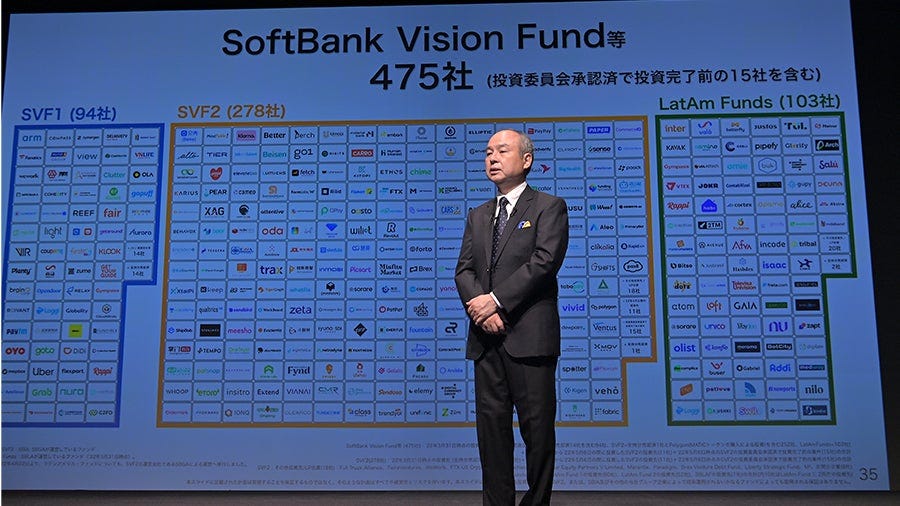
SoftBank has reported a record ¥1.7 trillion net loss for the year ended March, marking a sharp dip in the ¥4.99 trillion profit recorded in the year prior and blazing passed the ¥1.36 trillion net loss from two years ago.
The Japanese giant’s woes were driven primarily by its Vision Fund posting a ¥3.5 trillion loss, the biggest for the fund since it first began in 2017.
The result for the vision fund stands in stark contrast to the ¥4.03 trillion profit announced for the year ending March 2021. That strong performance came largely off the back of gains from the then recently-listed Coupang and DoorDash, which provided unrealised valuation gains amounting to $25.3 billion and $7.6 billion, respectively.
This year instead provided an unrealised loss on valuation totalling ¥3.63 trillion for all of SoftBank’s listed portfolio companies, including losses of ¥1.65 trillion recorded for Coupang, and ¥911 billion for DiDi.
Additionally, SoftBank’s equity method investments related to Alibaba were ¥388 billion, a decrease of ¥185 billion year-on-year. In its report, the company claimed that this was mainly due to a decrease in investment gain on Alibaba’s investments classified as financial assets. The decrease was put down to an increase in investments for growth initiatives, increased spending for user enhancements, and increased support to e-commerce merchants.
During the full year results presentation, SoftBank CEO Masayoshi Son said that the fund must be put into “defence mode”, and that the goal should be to “pile up lots of cash in hand”.
“Nobody knows what’ll happen tomorrow, in this kind of market, so we have to prepare for the worst,” said Son.
Son claimed that rising interest rates were putting pressure on the market and were partly to blame for the loss as technology stocks continue to fall.
Additionally, the company noted that there are growing concerns of a global economic slowdown as energy prices surge as part of the fallout of economic sanctions against Russia following its invasion of Ukraine, combined with the onset of tightening in the US to curb inflation, and continued supply chain disruptions — particularly in China — due to COVID-19.
Despite the doom and gloom, the CEO was adamant that the long-term future of the vision fund remains bright.
“I’m am a long-time believer of the technology evolution — so maybe, it is the best time to buy,” Son added.
SoftBank, meanwhile, returned a ¥864 billion valuation gain for unlisted portfolio companies. The company claimed that for the entire fiscal year, net valuation gains were recorded due to an “overall increase in the fair value of those with funding rounds, those that are expected to be listed, and those whose performance is progressing faster than expected”.
One of those few shining lights in SoftBank’s portfolio was chip designer Arm. It saw 2021 total revenue up 35% to $2.7 billion with strong growth in both royalty and non-royalty revenue. The chip designer also saw earnings before interest, taxes, depreciation, and amortisation up by 68% year-on-year to $1 billion.
In February, the intended merger of Nvidia and Arm was declared dead in the water, with the firm’s CEO Rene Haas claiming at the time that Arm was “well-positioned to grow going forward.”
In a statement released Thursday, Haas declared the chip designer’s results to be a demonstration that “the demand for Arm technology and the strength of the Arm ecosystem has never been greater”, and announced that a record 29.2 billion chips built on Arm IP were shipped in FY21, including approximately 8 billion in the fourth quarter.
Following the termination of the agreement with Nvidia, the deposit of $1.25 billion that SoftBank had received at the time of signing in September 2021, was non-refundable. Consequently, ¥110 billion, which corresponds to a 75% interest in Arm held by SoftBank, was recognised as profit in the fourth quarter.
In September last year, SoftBank announced that it would allocate an additional $3 billion to invest in technology companies in the Latin American market. Labelled as the SoftBank Latin America Fund II, the new fund aimed to build on SoftBank’s initial Latin America Fund, which had then been allocated $5 billion.
According to the company, SoftBank’s Latin America Funds made investments totalling $4.3 billion in the fiscal year, including 65 new investments and held 101 investments as of the end FY2021. With regard to this part of the business, unrealised gain on the valuation of investments totalled ¥119 billion




















